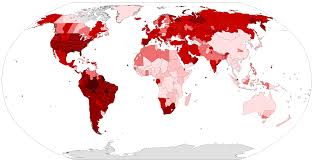The global outbreak alert for coronavirus has been raised to its highest level amid increasing fears of a pandemic and new cases confirmed in six countries.
Mexico announced its first two cases of the deadly respiratory illness as coronavirus took hold in the highly populated Latin American region and officials confirmed a growing number of discharged patients testing positive again after being cleared of the virus.
The World Health Organisation (WHO) has raised the global threat level from “high” to “very high” as hopes of a quick economic recovery were shattered by the share market’s worst week since the global financial crisis in 2008.
There are now more than 50 countries with the virus, with the worst affected remaining China which reported its lowest daily increase in cases for a month, with 328 new infections (from 78,800 total cases and 2800 deaths).
Other countries account for about three-quarters of new infections with the worst-affected including South Korea, reporting 571 new cases on Friday, Japan (931 infections and 10 deaths) and Italy (650 infections and 15 deaths).
Suspicions have been raised that Iran’s official death toll of 34 could be up to six times higher.
Another two cases have been confirmed in Australia: A 63-year-old woman on the Gold Coast who had recently returned from Iran and a 79-year-old female West Australian cruise passenger from the Diamond Princess.
Reappearing virus
Fears are growing that the epidemic may be even harder to eradicate as it emerges that patients who had recovered from COVID-19 are testing positive again, even weeks after quarantine.
Japan and China have reported examples of people who had been given the all clear and released from quarantine later testing positive.
One case involved a Japanese tour bus guide and another was a man in China whose follow-up test 10 days after returning home was positive.
The ABC reported as many as 14 per cent of cases in China are recovered patients, citing a disease expert in China’s Guangdong province.
WHO spokesman Christian Lindmeier said experts were looking very carefully into an apparent increasing number of cases of re-infection.
Explanations include infected people not developing immunity, the virus being able to remain dormant in its victims or testing discrepancies.
Scientists are also investigating the possibility of coronavirus spreading to pets after a dog tested “weak positive” in Hong Kong.
The animal, owned by a coronavirus patient, has been quarantined after examinations of its nasal and oral samples however the dog did not show symptoms.
Hong Kong’s Agriculture, Fisheries and Conservation Department (AFCD) said it would conduct further tests to confirm if the dog had been infected with the virus or if the samples were the result of environmental contamination.
“At present, the AFCD does not have evidence that pet animals can be infected … or can be a source of infection to people,” it said in a statement.
‘High risk’ level
WHO chief Tedros Adhanom Ghebreyesus said his organisation was not underestimating the outbreak risk.
“That is why we said today the global risk is very high,” he told reporters in Geneva.
WHO spokesman Christian Lindmeier said the scenario of the coronavirus reaching multiple or all countries “is something we have been looking at and warning against since quite a while”.
The Mexican government has confirmed the first two cases of the novel coronavirus, with the cases linked to travel from Italy.
A 35-year-old man in Mexico City and a 41-year-old man in the state of Sinaloa tested positive for the potentially deadly virus after having travelled to Italy, health official Hugo Lopez-Gatell said on Friday.
The men are showing only slight symptoms and have been placed in isolation, he said.
Latin America’s first case of the coronavirus was confirmed in Brazil on Wednesday and there are suspected cases in at least 10 other countries in the region.
Switzerland joined countries banning big events to try to curb the epidemic, forcing cancellation of next week’s Geneva international car show – one of the industry’s most important gatherings.
China’s three biggest airlines restored some international flights and the Shanghai fashion show, initially postponed, went ahead online.
But as the outbreak eases in China, it is surging elsewhere.
Mongolia, which has yet to confirm a case, placed its president, Battulga Khaltmaa, in quarantine as a precaution after he returned from a trip to China, state media reported.
In addition to stockpiling medical supplies, some governments ordered schools shut and cancelled big gatherings to try to halt the flu-like disease.
US President Donald Trump’s administration was considering invoking special powers to expand production of protective gear which is in short supply globally.
The head of the WHO’s emergency programme, Mike Ryan, said Iran’s outbreak may be worse than realised – its toll of 34 dead is the highest outside China.
Tedros said he expected a WHO team to be in Iran by Sunday or Monday

